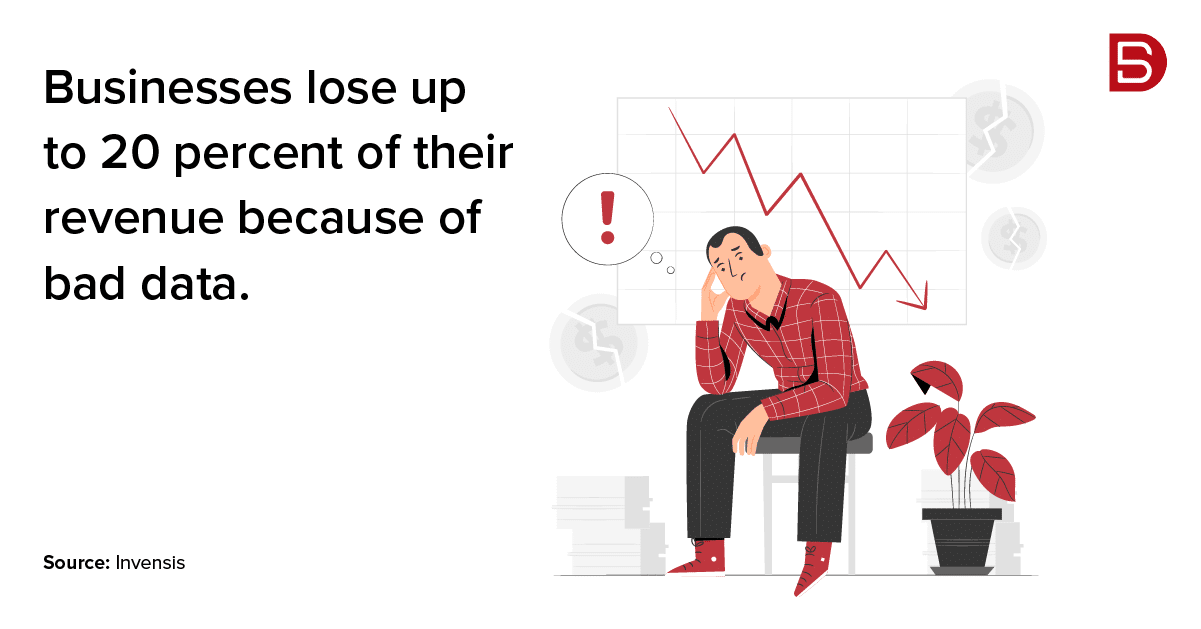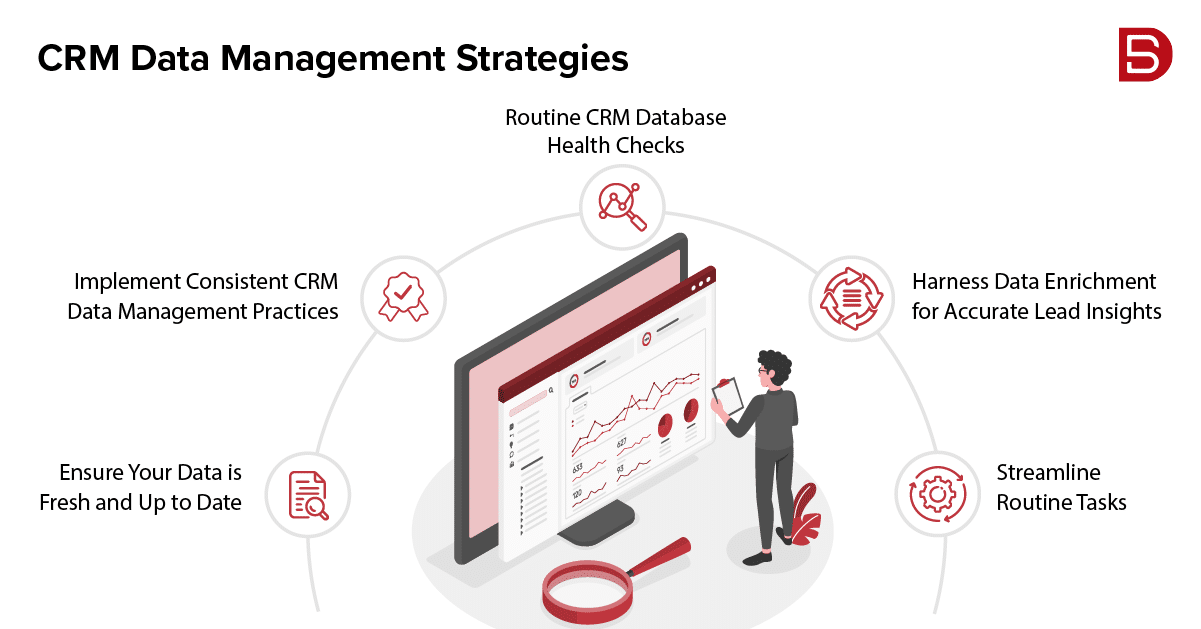Can investing in a Customer Relationship Management (CRM) system alone ensure a structured B2B database and align your business development teams? The answer is, not quite. The crux of the matter lies in the quality of your CRM data. Without high-quality data, your sales and marketing teams won’t be able to fully unlock their potential, and the value of your investment might remain untapped.
Today, CRM systems are pivotal to most organizations. However, to make the most of your CRM, you need not only accurate data but also actionable insights and an optimized data quality strategy.
In this blog, we’ll explore how bad CRM data impacts your B2B business and share five effective practices for enhancing the quality of your B2B CRM database.
Table of Contents
What is CRM Data Management?
Customer Relationship Management (CRM) data management refers to the process of collecting, storing, organizing, and maintaining data related to a company’s interactions with its customers. This data is invaluable for sales and marketing folks as it contains details about the industries and key decision-makers of potential clients. To be effective, the data must be accurate, up-to-date, and well-organized, with specific categories for each client and prospect within the CRM system.
This approach provides a complete view of each client’s profile. Efficient CRM data management strengthens customer relationships, promotes long-term loyalty, and fuels ongoing sales growth. It also helps define target areas, streamline sales strategies, and create custom-tailored marketing campaigns.
The Impact of Bad CRM Data on Your Business
The impact of poor CRM data on your business can be significant. While data can be a valuable tool for problem-solving, performance tracking, process improvement, and industry knowledge, the opposite holds true when data quality is lacking.
1. Disrupts Business Processes
When data management is marred by inconsistencies, it affects various business operations, as data serves as the lifeblood of all departments within your organization. Even a small error in master data can trigger a domino effect that becomes difficult to halt once it’s set in motion.
To rectify data disparities, valuable corporate resources must be redirected toward root-cause analysis and implementing corrective actions. This, in turn, can impact employee productivity.
2. Increased Costs
Inaccurate or bad data not only leads to misguided decisions in a marketing campaign due to unreliable information but also drives up expenses. For instance, consider a scenario where a company’s marketing campaign targets the wrong audience, resulting in poor engagement and minimal conversion rates. Relying on flawed data can lead to a decline in campaign effectiveness, constituting direct costs associated with the misuse of inaccurate information.
Additionally, indirect costs may include ineffective ad spend, reduced brand reputation, and employee dissatisfaction stemming from a poorly performing campaign. Bad data within your marketing campaign analytics can hinder the achievement of your campaign goals, indirectly impacting your company’s financial success as your investment in the campaign’s execution becomes less effective.
3. Compromised Regulatory Compliance
Compliance is a crucial aspect of any business, particularly when it comes to the use of personal data, which is governed by data privacy laws in numerous countries. Businesses entrusted with private customer information must take diligent measures to ensure data security and quality.
Systematically maintaining data quality is essential, especially to verify the authenticity of your contacts. For example, sending information to someone who never requested it could occur due to an incorrectly spelled email address. In cases where an organization’s data is inaccurate, they run the risk of facing regulatory fines. There have been instances where businesses had to pay penalties for sending text messages to phone numbers that had been reassigned to different owners.
To avoid the hidden costs of bad data in your business, consider partnering with a trusted data quality management services provider. By entrusting experts in data quality, you can enhance the accuracy and reliability of your data. This not only helps you save on costly errors but also unlocks the potential for increased efficiency and higher customer satisfaction.
Effective CRM Data Management Strategies for Enhanced B2B Data Quality
A robust CRM system begins with effective CRM data management. To enhance your data quality, here are five tried-and-true strategies:
1. Routine CRM Database Health Checks
One of the crucial steps in maintaining high-quality data within your CRM is consistently assessing the overall health of your database. Believe it or not, approximately one-third of CRM data tends to go stale. Marketing experts even suggest that around 30% of your data can become inaccurate, corrupt, or simply outdated.
Why? Well, contacts change companies, clients update their info, folks move up the ladder, you name it. This data contamination can have a significant impact on your business if left unaddressed.
2. Establish Consistent CRM Data Management Practices
Creating a standardized data management process that’s followed by every team in your organization is a game-changer. Without it, high data quality remains out of reach. When your business lacks well-defined procedures for handling client data, inaccuracies, outdated information, and missing data are practically guaranteed. By implementing clear user workflows and data management protocols, you can streamline the process of gathering and storing information in your CRM.
3. Ensure Your Data Is Fresh and Up to Date
Maintaining relevance and cleanliness in your company’s CRM data calls for effective data management. The best way to kickstart data management is by tidying up the older data and ensuring it stays that way. Here are some tips to keep your current data accurate and up to date:
- Set a regular cleanup schedule to identify and address missing key information. You can use filters to spot gaps in contact details, like phone numbers or email addresses.
- Implement exception reports: Once you implement data cleansing techniques, create monthly exception reports to pinpoint records with missing data.
- Merge duplicates: Another handy technique is consolidating multiple duplicate records into one complete entry.
4. Harness Data Enrichment for Accurate Lead Insights
Ensuring that any new data received is accurate is crucial, especially after you’ve cleaned up your existing data. Prospective clients who provide information through your website or a similar channel might not always provide complete or accurate details. Updating your CRM database with clean data is a proactive step that can help you avoid future headaches and save both time and money.
B2B data enrichment involves eliminating redundant information, correcting inaccuracies, and filling in missing details. You can achieve this either through manual efforts or by exploring reliable data enrichment services that can take your data to the next level.
5. Streamline Routine Tasks
Opting for automation, especially for tasks like CRM data entry, is a smart move. It not only saves your sales representatives time but also increases the likelihood of them maintaining comprehensive and accurate records in your CRM. The beauty of CRM data automation lies in its ability to cut down on redundancy, eliminate missing information, and reduce errors. Moreover, it ensures that your data remains up to date.
By automating and reducing the time your staff spends on manual administrative tasks, such as entering data into the CRM, you free up more of their valuable time for tackling more critical projects.
Conclusion
It’s evident that robust CRM data management is the key to unlocking profitable opportunities and building strong customer relationships for your B2B business. By following these best practices, you’ll see a significant boost in your data quality. This, in turn, equips your B2B sales and marketing teams with the insights they need to streamline the sales process and discover better data solutions.
If you wish to step up your data game, write to us at marketing@datamaticsbpm.com. Our all-encompassing CRM data quality services, in tandem with our data cleansing solutions, can help examine, refine, enrich, and oversee your B2B data seamlessly.
 Select an element to maximize. Press ESC to cancel.
Select an element to maximize. Press ESC to cancel.
James Libera




